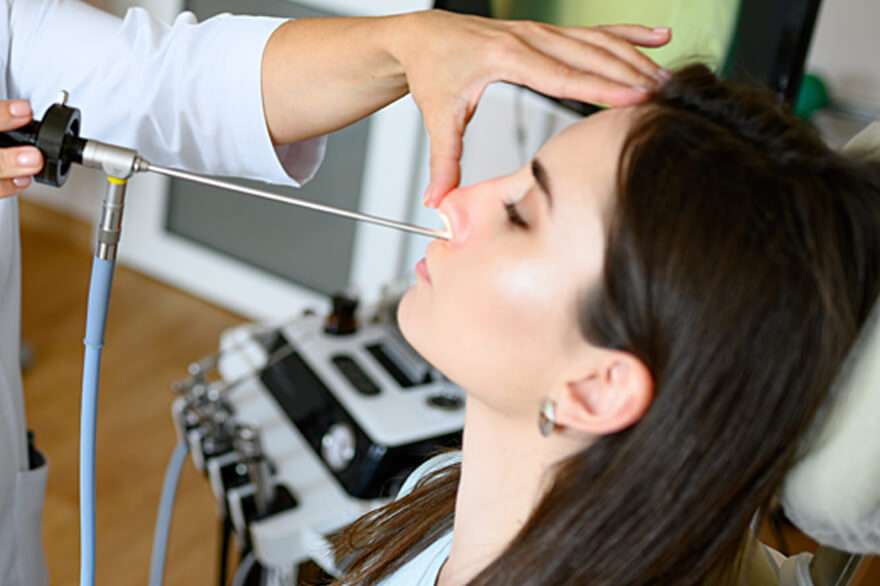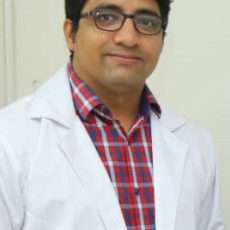
Nose Conditions
Nose Conditions
When we inhale through our two nostrils, air travels up your nasal passages, moves into the nasal cavity, passes through the trachea and ends in the lungs. Thanks to the olfactory epithelium — it is a tissue covered in mucus that lines the nasal cavity, our nose warms, moistens and filters the air before it enters the lungs. The epithelium is also responsible for our ability to smell odours. Epithelium contains millions of olfactory receptors that bind with specific odour molecules to help us identify certain smells — one trillion different odours,
ENT physicians, or otolaryngologists at Dr Aravind’s ENT and EYE hospital, are specially trained in rhinology — disorders of the nose and sinuses.
Let’s look at the most common nose disorders that we diagnose and treat.
1) Sinusitis
Sinusitis is an inflammation and infection in the sinuses which are the air-filled cavities within the face that branch off from the nasal cavity. Sinusitis is one of the most common health complaints as my people are diagnosed with chronic sinusitis. Our doctors may use X-rays or a CT scan to diagnose sinus disease.
If your infection is acute, treatment may involve decongestants, antibiotics, nasal steroid sprays, antihistamines and irrigations. But if your infection does not respond to medication and keeps coming back, you may need endoscopic sinus surgery (ESS).
2) Deviated Septum
Chronic sinusitis can be blamed on the shape of the nasal cavity. The nasal septum is the vertical wall that separates your nasal cavity into two nostrils. The ideal nasal septum is exactly midline, separating the left and right sides of the nasal cavity into airways of equal size. However, more than 80 percent of people have nasal septums that are slightly off-center. When the septum is shifted away from the midline severely, the condition is called a “deviated septum.”
A deviated septum may cause:
- Blockage of nostrils that cause difficulty breathing through the nose.
- Nasal congestion, sometimes one-sided.
- Frequent nosebleeds.
- Repeated sinus infections.
- Facial pain, headaches, postnasal drip.
- Noisy breathing during sleep in children and infants
To correct a deviated septum a surgical procedure like Septoplasty may be performed entirely through the nostrils. It is usually done to improve nasal breathing and sometimes may be combined with sinus surgery. It may also be performed to allow doctors to examine the inside of the nose before treating or removing tumors or polyps.
During the operation, the surgeon may remove badly deviated portions of the septum, or readjust and reinsert them into the nose. The patient can expect full relief from chronic sinusitis if deviated nasal septum was the sole cause.
3) Nasal Polyps
Nasal polyps are soft, non-cancerous growths on the lining of the nose or sinus most often caused by inflammation due to allergies. Although small nasal polyps may not show symptoms, larger growths or multiple polyps can cause breathing problems and frequent infections.
Medications are sometimes sufficient to eliminate or shrink the polyps, but surgical removal is often required along with medications to prevent more from developing.
4) Nasal Allergy (Allergic Rhinitis)
Allergic rhinitis is a condition associated with a group of symptoms affecting the nose. Symptoms like this occur when you breathe in something that you are allergic to, such as animal dander, pollen or dust. Such symptoms can also occur when you eat food that you are allergic to.
Causes
An allergen triggers an allergy. When a person with allergic rhinitis breathes in an allergen like mold, pollen, animal dander, or dust, the body releases chemicals that cause allergy symptoms.
Hay fever involves an allergic reaction to pollen.
Plants that cause hay fever are ragweed, grasses, and trees. Their pollen is carried by the wind. Hay fever is not caused by the pollen from flowers carried by insects. The type of plants that cause hay fever varies from area to area and from person to person.
The amount of pollen present in the air might affect whether hay fever symptoms can develop or not.
- Hot, windy, dry days are more likely to have a lot of pollen in the air.
- Most pollen is washed into the ground on cool, damp, rainy days.
Allergies and Hay fever often run in families. If your parents have other allergies or hay fever, you are very likely to have hay fever and allergies, too. The chances are much higher if your mother has allergies.
Symptoms
The symptoms after you come into contact with the substance you are allergic to may include:
- Itchy eyes, mouth, throat, skin or any area
- Problems with smell
- Runny nose
- Sneezing
- Watery eyes
Symptoms that can develop later include:
- Stuffy nose (nasal congestion)
- Coughing
- Clogged ears and decreased sense of smell
- Sore throat
- Dark circles under the eyes
- Puffiness under the eyes
- Fatigue and irritability
- Headache
- Recognizing invader
When to Contact a Doctor
Call Dr Aravind’s ENT and EYE Hospital, Suchitra-Kompally, for an appointment if,
- You have severe hay fever symptoms
- Treatment that once worked for you works no longer
- Your symptoms do not respond to treatment
5) Nosebleed (Epistaxis)
What is a nosebleed?
Nosebleeds (also called epistaxis) can occur easily from the fragile tissue that lines the inside of your nose. Though most nosebleeds can be handled at home, certain symptoms should be checked by a physician.
Nosebleeds are common. Around 60-80% of people in their lifetime will have at least one nosebleed. A large number of blood vessels situated close to the surface in the lining of your nose and the location of the nose in the middle of the face makes it an easy target for injury and nosebleeds.
How do I stop a nosebleed?
Follow these steps to stop a nosebleed:
Relax.
- Sit upright and lean your head and body slightly forward. This will control the blood from running down your throat, which can cause vomiting, nausea, and diarrhea. (Do NOT bend to put your head between your legs or lay flat)
- Breathe through your mouth.
- Pinch together the soft part of your nose using your thumb and index finger. Ensure that you pinch the soft part of the nose against the hard ridge that forms the bridge of the nose.
- Continue pinching your nose for at least 5 minutes before checking if the bleeding has stopped. If the bleeding still continues, keep squeezing the nose for another 10 minutes.
- If you want, you can try applying an ice pack to the bridge of your nose to further help constrict blood vessels (which will slow the bleeding) and provide comfort.
- After the bleeding stops, DO NOT bend over, strain or lift anything heavy. DO NOT rub or blow your nose for several days.
Contact Dr Aravind’s ENT and EYE Hospital, Suchitra-Kompally, for an appointment if,
- If the bleeding does not stop for more than 15 to 20 minutes of applying direct pressure on your nose as described in the steps above.
- The blood loss is large (more than a cup) or bleeding is rapid.
- You are having difficulty breathing.
- You have you’ve swallowed a large amount of blood and vomited.
- Your nosebleed is after a blow to your head or serious injury
- You get nosebleeds often.
- You have symptoms of anemia like feeling weak or faint, tired, short of breath, pale skin cold.
- You have a child below two years of age who has had a nosebleed.
- You have a blood clotting disorder or taking blood-thinning drugs (such as aspirin or warfarin) and the bleeding won’t stop.
- You have started a new medication and nose bleeding seems to have occurred due to this.
You get nosebleeds and also notice unusual bruising all over your body. This combination might indicate a more serious condition such as a blood clotting disorder (hemophilia or von Willebrand disease), leukemia or nasal tumor and will need to be checked by your doctor.)
If you are concerned that you are experiencing infections or breathing difficulties related to a nose condition, Dr Aravind’s ENT and EYE Hospital provides treatment for a wide range of nasal and sinus conditions and provide compassionate, individualized care for children and adults.
Our specialists have received extensive training and completed a variety of procedures, offering the best ENT care for our patients. Our team also has access to a variety of specialties to ensure that patients receive coordinated care.
Meet Our Doctors

Dr. Aravind Kumar Alwala
MBBS (Osm)., MSENT specialist, Chief Endoscopic Sinus Surgeon
Make an Appointment
Dr. Laxmi Priya Pallapolu
MBBS (Gold Medalist)., MS Ophthal (FICO)Consultant Ophthalmologist, Chief Phaco Surgeon
Make an Appointment